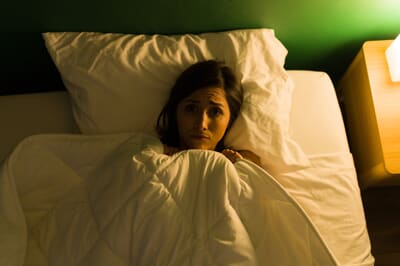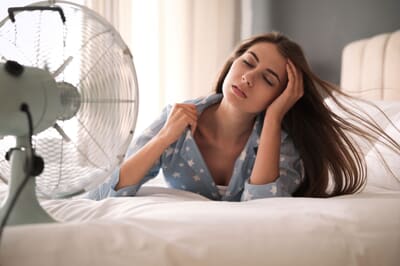Are you the proud owner of a uterus? You’ll likely have experienced the monthly tossing and turning through the night, willing the cramps away as you curse Mother Nature. Sometimes, no amount of hot water bottles, Feminax, or Dairy Milk can ease the pain of your period.
We know how tough it can be when you can’t sleep because of period cramps, so we’ve researched the seven most effective ways on how to sleep with period cramps to prevent them from keeping you up at night.
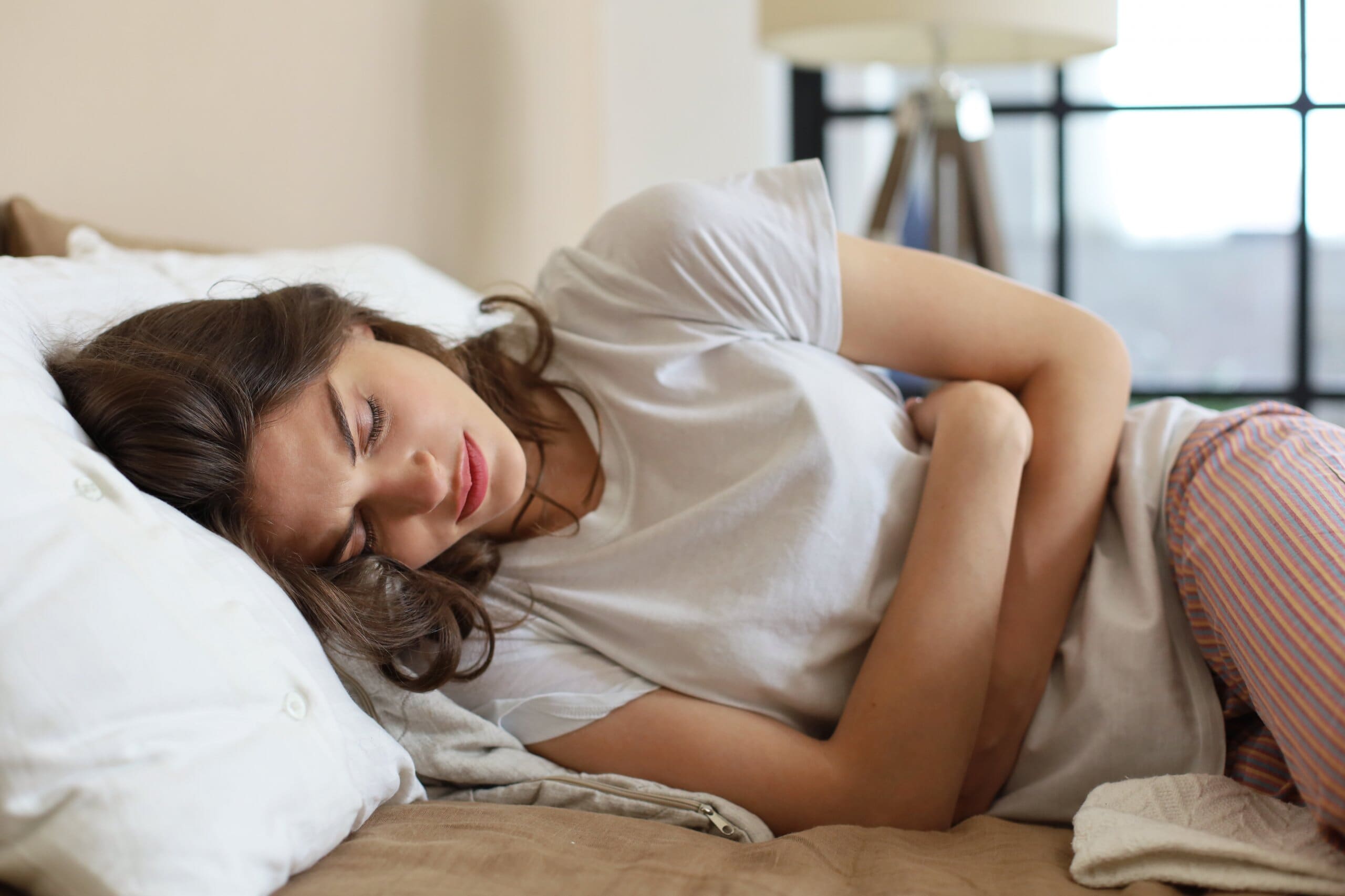
What causes period pains?
You probably learnt all about the menstrual cycle at school, but what actually causes period cramps? Although it might feel like you’re being stabbed in the gut - you’re not.
Period cramps happen as a result of your womb contracting to shed its lining and push blood out.
Prostaglandins (a hormone-like substance) cause these contractions. The levels of this substance is higher at the beginning of your period, which causes your cramps to be worse on day one than at the end of your period.
Some people suffer from ovulation pain, too, which can be described as a one-sided pain in the lower abdomen when ovulating. This can be a dull cramp or a sudden sharp pain.
Really bad period cramps (dysmenorrhea) happen when oxygen can’t reach the uterus due to the uterus walls contracting.
If you suffer from really heavy periods and severe pain, you should speak to your doctor. You can also speak to your doctor about endometriosis, where your uterus lining becomes inflamed, which can cause difficult periods.
Why can’t I sleep on my period?
Why is it that you can’t sleep because of period cramps? Martin Seeley, the CEO and sleep expert at MattressNextDay says:
"Studies have found that 30% of women struggle to get to sleep when on their period. While painful cramps are the most common cause, there are lots of other side effects that can stop women from getting the restorative sleep that they require.
"For example, many women wake up with headaches and back pain in the night and struggle to go back to sleep. Then there’s PMS, which can increase a woman’s cortisol levels (otherwise known as the stress hormones), therefore making it harder to switch off at night.
"Then there’s the periods themselves. You lose 1mg of iron every day while on your period due to blood loss, which results in you feeling extremely tired once your period is over. However, worrying about bleeding through to your bed sheets can also make it harder to fall asleep at night, or even wake you up in the middle of the night, causing a broken sleep."
Why is period pain worse at night?
You might be wondering, why are period cramps worse at night? Period pain can seem more intense at night for several reasons. First and foremost, lying down can increase blood flow to the uterus, intensifying discomfort.
Additionally, the stress and tension accumulated during the day might become more noticeable at night when you're trying to relax. This is because it’s likely you’ll experience fewer distractions on the evening – especially if you’ve had a busy day.
Lastly, period cramps can disrupt sleep in itself, making the pain seem more prominent – it’s harder to ‘sleep away the pain’, so to speak, making the cramps feel worse. Find out more on how to stop period cramps at night below.
Seven ways to sleep with period cramps
1. Consider the benefits of CBD Oil
If you’re wondering how to help period cramps at night, CBD oil might be an option worth exploring. Finding the right pain relieving medication for you is important. Not every medication will work for everyone.
Cannabidiol, otherwise known as CBD oil, can work for menstrual pain, as it has anti-inflammatory effects. This makes it great for pain relief, with period cramps being no exception.
Research shows that women with endometriosis self-rated cannabis or CBD oil as the most effective at relieving their pain. You can use CBD oil by popping a small amount directly under your tongue - this is a capillary-rich area so it’ll reach your bloodstream quicker for a faster effect.
You can also drop CBD oil into your coffee or smoothie, or rub it into your skin, it’s up to you!
Tampon manufacturers Daye create tampons that have a CBD coating, developed to help ease period pain. On their website, NHS doctor Belinda Coker states that she uses Daye CBD tampons at night to help with period symptoms.
If you’re not a fan of the CBD scene, ibuprofen also treats inflammation. There are also plenty of medications dedicated to relieving period pain specifically, such as Feminax and Nurofen Period Pain. You should check with your doctor before taking any new medication, though.
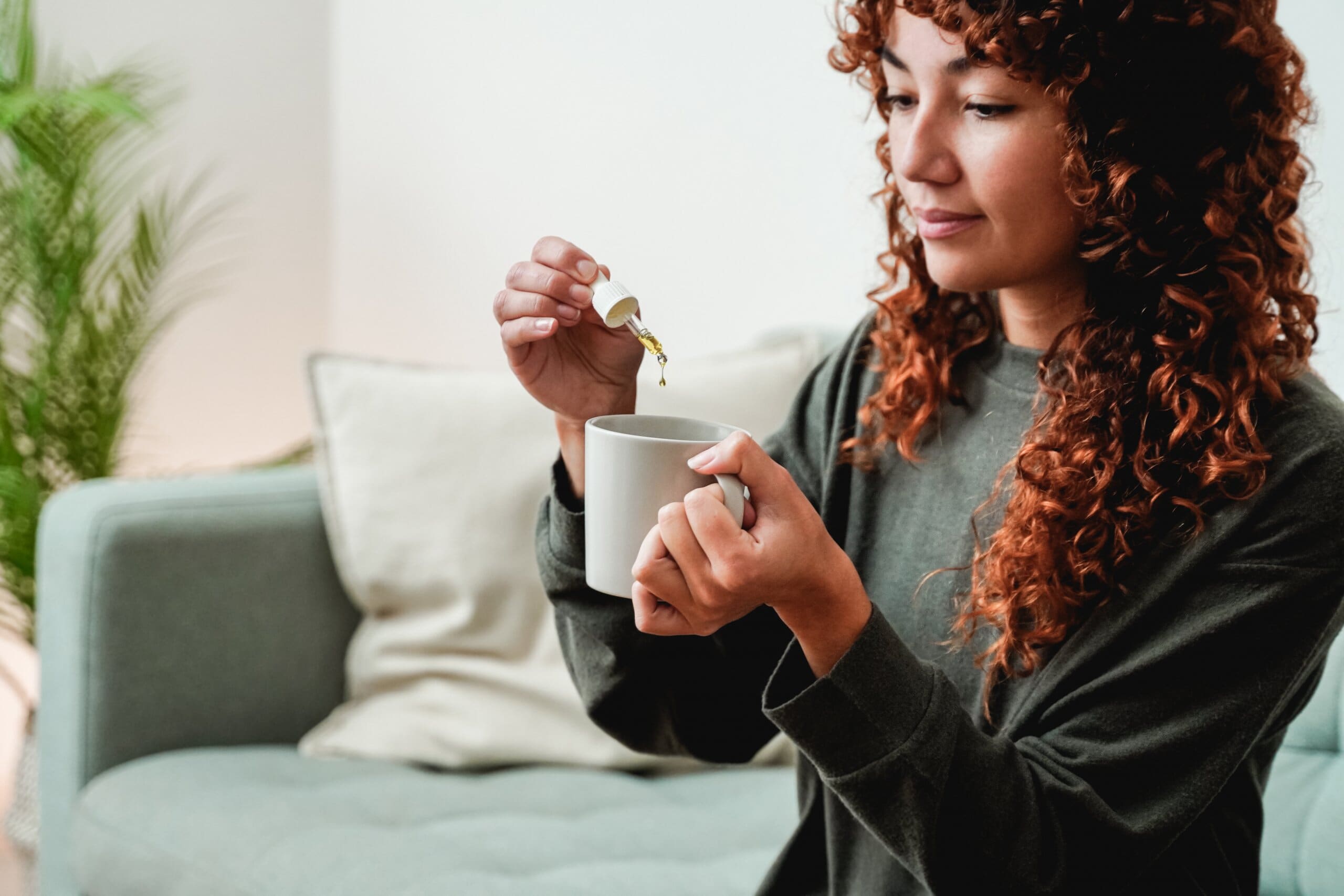
2. Try pain-preventing tech
There are a number of gadgets that can help ease your suffering during your period. The Myoovi has recently hit headlines as an incredible 92% of users experienced significant pain relief.
How does the Myoovi work? It’s a small, wireless pad that attaches to your body under your clothes. The Myoovi uses TENS (transcutaneous electrical nerve stimulation) to interrupt the pain signals going to your brain. As instant pain relief, this portable patch has a battery life of up to ten hours, so is perfect for wearing at nighttime.
Similarly, the Cosmopolitan-approved BeYou monthly patches provide targeted period pain relief, and are ideal for sleep. Releasing pain-relieving molecules over a 12 hour period, these thin, discreet patches are described as ‘like witchcraft’!
3. Eat more anti-inflammatory foods, such as watermelon and cucumber
Staying hydrated is key to maintaining your body’s ability to do what it needs to do. Drinking enough water can reduce your chances of getting a headache, too.
Water-rich foods can help with keeping you hydrated, such as cucumber and watermelon. Sweet fruits like watermelon can also help curb your sweet cravings, which just lead to a spike in glucose and then the ultimate sugar crash.
Sipping a warm mug of ginger tea before bed can help ease period cramps. Ginger has natural anti-inflammatory properties, and can soothe achy muscles including your uterus!
You lose iron on your period through blood loss, so iron-rich foods such as dark chocolate, fish and leafy greens like spinach can help stop you feeling drowsy during the day.
4. Make sure you’re in the best sleeping position
If you’re bent over double trying to ease your period cramps, you might already find yourself in the foetal position. This is actually the best position to sleep in during your period, as it helps to relax your abdominal muscles and joints around your uterus.
Lay on your side with your knees tucked towards your chest - you can use pillows between your legs to make this more comfortable.
Sleeping on your stomach is not recommended for easing period pains as it adds more pressure to your abdomen.
The right mattress is absolutely essential for relieving pressure, which can help to ease cramps. Orthopaedic mattresses are known for relieving back pain, but their targeted pressure relief can also help with any muscular pain.
The super soft Emma® Microfibre Pillow can be adjusted with removable inserts to support you exactly how you need it to in the night. Helping to relieve aches and pains, this large pillow can provide exceptional support when you’re on your period. Plus, it has a removable, machine-washable cover, so don’t worry about stains.
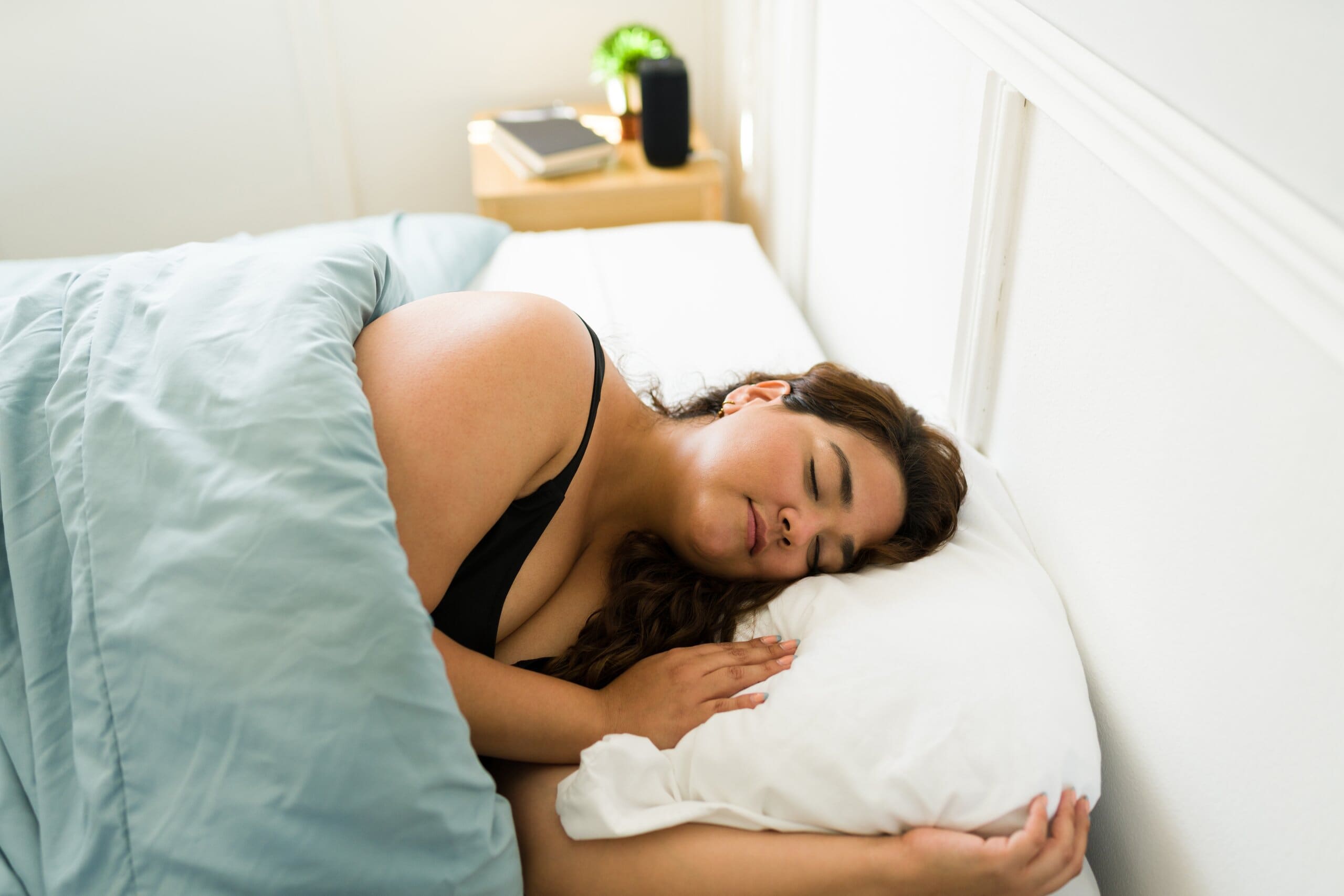
5. Consider getting frisky with your partner - it could even end your period earlier
Period sex can be a bit messy, but if you’re prepared and comfortable, it can benefit you massively. Plus, changing levels of oestrogen during your period can increase your sex drive, so it’s worth a try!
When you orgasm, you release chemicals like dopamine and serotonin, which help you feel pleasure. Dopamine also acts as a natural painkiller as it increases your pain tolerance - perfect for dealing with painful periods.
Orgasms also cause blood to rush to your uterus, as well as contracting and releasing the muscles in your uterus, which can ease cramps.
Period sex might even help to end your period quicker, as blood and uterus lining can be pushed out faster when you climax.
To make it a less messy affair, you can invest in a good mattress protector. You don’t necessarily need a partner to join you - masturbation can do the trick, as long as you’re reaching orgasm.
Period sex isn’t for everyone, but here are some tips to make it easier:
- If you have a tampon in, make sure to remove it
- Place a dark coloured towel down to prevent staining your sheets
- Be honest with your partner and communicate properly
- Figure out which position works best for you - you might have to switch up from your usual positions
- Remember that you can still conceive when on your period, so use protection unless you’re trying for a baby
- Have wet wipes nearby to help clean up afterwards
6. Make an effort to move your body
When you exercise, your brain releases endorphins. These not only boost your mood, combating the stress of a painful period, but also increase your pain tolerance.
Benefiting both your mental and physical health, exercising while on your period can help to relieve painful cramps.
You’re likely to have less energy when menstruating, and high cardio exercises aren’t always appropriate for that time of the month, but yoga and pilates can provide brilliant pain-relieving benefits.
The calming effects of yoga can help you deal with the pain associated with periods. Breathing exercises and muscle relaxation can help reduce your stress levels and calm your nervous system, while helping get enough oxygen to your muscles, such as the muscles in your uterus.
7. Make sure you're prepared for leaks
You’ll struggle to get to sleep on your period if you’re up all night worrying about leaking. If you’re worried about spills and stains, make sure whatever period product you use is right for your body and your flow.
Leading sanitary product experts, Always, suggest using a pad with wings as they stay secured to your underwear better, and don’t tend to shift as you move in the night.
Getting up slowly in the morning is key to avoiding spillage, too, especially if you use pads at night. As you’re laying horizontal as you sleep, the blood pools in your vagina, which will come out quickly as you stand up.
If you get blood on your mattress or bedding, don’t fret! Our guide on getting blood out of a mattress has plenty of tips and tricks to help. Here are some of our favourite tips for getting blood stains out of your mattress:
- Mix up a paste of hydrogen peroxide, salt and cornflour. Cover the stain with this thick paste, letting the ingredients break it down. Once the paste has dried, scrape it off. You might need to repeat for really stubborn stains.
- For memory foam mattresses, use cold water to blot the stain initially, then use a dry cloth until the stain disappears.
- You can also sprinkle baking soda over blood stains on a memory foam mattress, dabbing it with a wet cloth.
- For bedding, you can use regular shampoo to pre-soak the material before putting it through a cold wash.
- Window cleaner can also help lift blood stains from your bedding, as it contains ammonia, which will remove fresh blood from your sheets quickly and easily!
Remember not to use hot water on blood stains, as this will ‘fix’ the stain into the material.
It’s important to listen to your body and to take care of yourself when you’re on your period. Our blog post on how to practise self-care in your sleep routine can help you discover how to make time for yourself and reduce your stress levels.
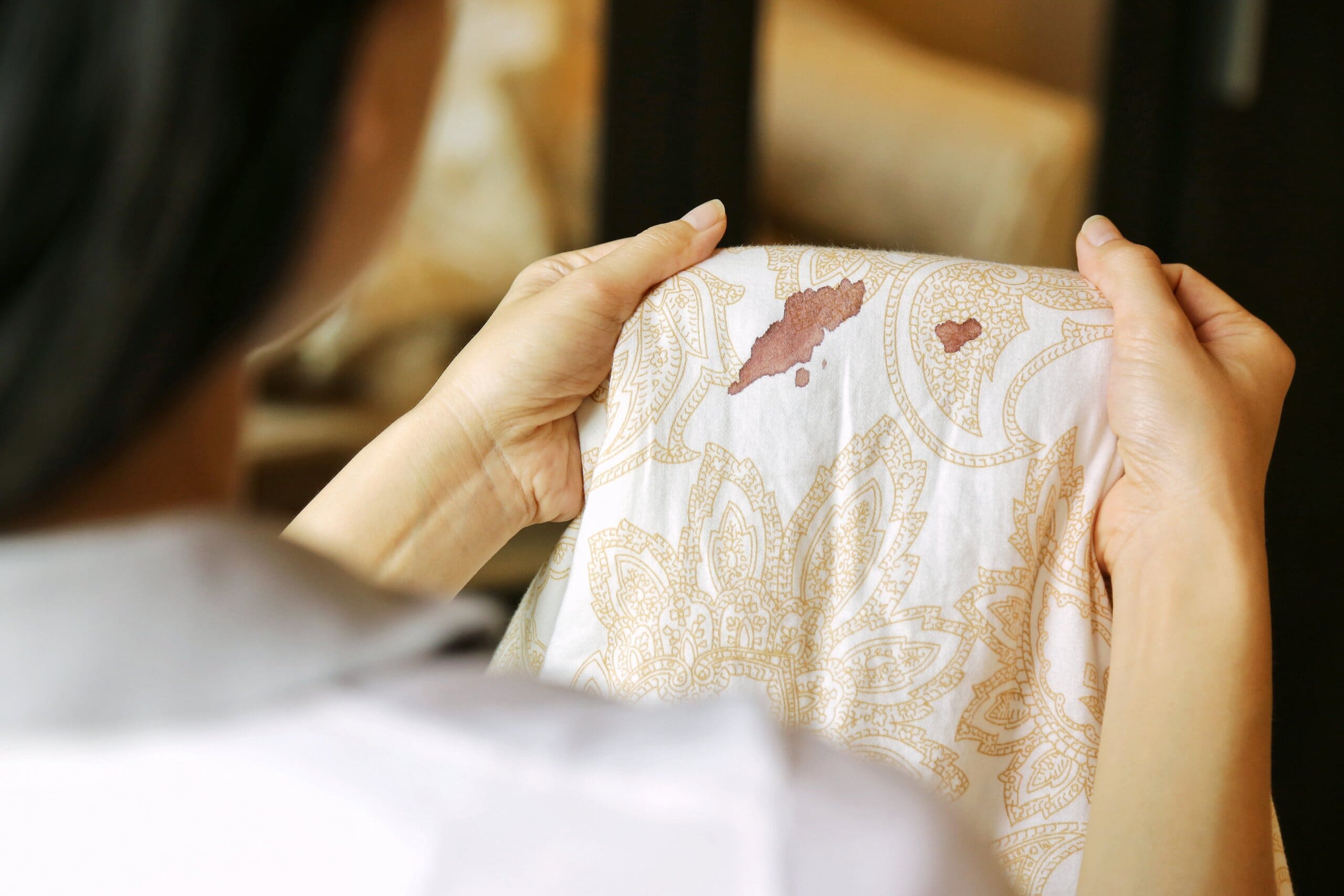
If none of these tips work for you and you still suffer from heavy, painful periods, we’d recommend talking to your doctor.
Optimise your sleep set-up
For the best night's sleep on your period, consider your overall sleep set-up. A supportive mattress can work wonders when it comes to prioritising your sleeping position and helping your body recharge - something that is essential when your body is working overtime on your period. Consider our range of mattresses and plush bedding with flexibile and free delivery options, just in time for your next period!

